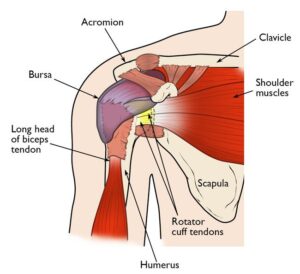Shoulder Tendinopathies and Shockwave Therapy: Why, When and How Long?


Diagram outlining major parts of the shoulder. Image courtesy of OrthoInfo.
Shoulder tendinopathies, also known as tendinitis or tendonitis, are a common condition that can cause pain and limited range of motion in the shoulder. One effective treatment option for shoulder tendinopathies is shockwave therapy, a non-invasive and safe treatment that uses high-frequency sound waves to stimulate healing and reduce pain.
But why choose shockwave therapy for shoulder tendinopathies? The answer lies in the way that shockwave therapy works. The sound waves delivered during shockwave therapy stimulate the body’s natural healing response, increasing blood flow and promoting the growth of new tissue. This can help to reduce pain and inflammation in the affected area and promote healing.
So, when is shockwave therapy appropriate for shoulder tendinopathies? At Barrhaven Health HUB, we typically recommend shockwave therapy for patients who have not responded to more conservative treatments like rest, ice, and physical therapy. Shockwave therapy may also be appropriate for patients who want to avoid more invasive treatments like surgery.
As for the length of treatment, the number of sessions required can vary depending on the severity of the condition and the individual patient’s response to treatment. Typically, patients will undergo a series of 3-6 shockwave therapy sessions spaced out over several weeks.
At Barrhaven Health HUB, our experienced therapists use the latest shockwave therapy technology to provide safe and effective treatment for shoulder tendinopathies. We’ll work with you to develop a personalized treatment plan that fits your needs and gets you back to your daily activities with comfort and confidence. Contact us today to learn more about our comprehensive approach to shoulder tendinopathy management.
Book your appointment here: https://barrhavenhealthhub.janeapp.com/
Additional links for extra research:
https://www.mayoclinic.org/diseases-conditions/tendinitis/symptoms-causes/syc-20378243
https://www.ncbi.nlm.nih.gov/pmc/articles/PMC6029898/
